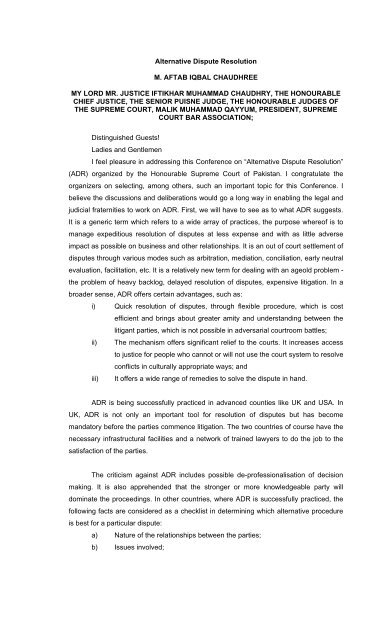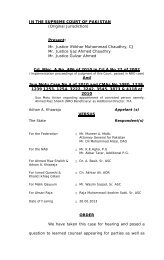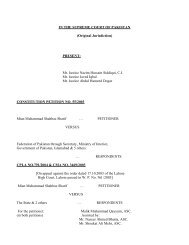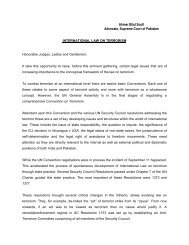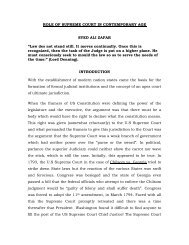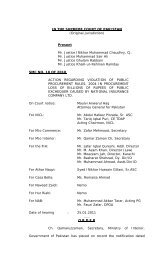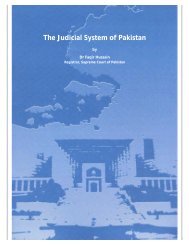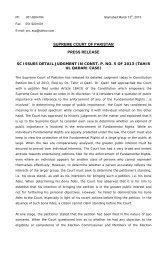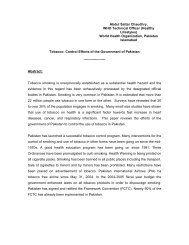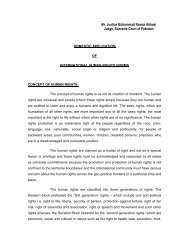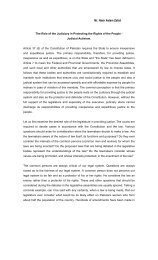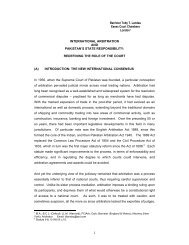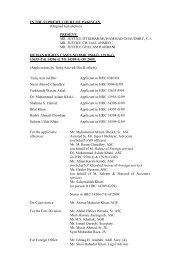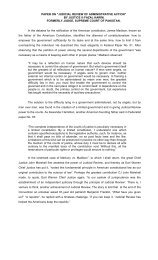M. Aftab Iqbal Chaudhree - Supreme Court of Pakistan
M. Aftab Iqbal Chaudhree - Supreme Court of Pakistan
M. Aftab Iqbal Chaudhree - Supreme Court of Pakistan
You also want an ePaper? Increase the reach of your titles
YUMPU automatically turns print PDFs into web optimized ePapers that Google loves.
Alternative Dispute Resolution<br />
M. AFTAB IQBAL CHAUDHREE<br />
MY LORD MR. JUSTICE IFTIKHAR MUHAMMAD CHAUDHRY, THE HONOURABLE<br />
CHIEF JUSTICE, THE SENIOR PUISNE JUDGE, THE HONOURABLE JUDGES OF<br />
THE SUPREME COURT, MALIK MUHAMMAD QAYYUM, PRESIDENT, SUPREME<br />
COURT BAR ASSOCIATION;<br />
Distinguished Guests!<br />
Ladies and Gentlemen<br />
I feel pleasure in addressing this Conference on “Alternative Dispute Resolution”<br />
(ADR) organized by the Honourable <strong>Supreme</strong> <strong>Court</strong> <strong>of</strong> <strong>Pakistan</strong>. I congratulate the<br />
organizers on selecting, among others, such an important topic for this Conference. I<br />
believe the discussions and deliberations would go a long way in enabling the legal and<br />
judicial fraternities to work on ADR. First, we will have to see as to what ADR suggests.<br />
It is a generic term which refers to a wide array <strong>of</strong> practices, the purpose where<strong>of</strong> is to<br />
manage expeditious resolution <strong>of</strong> disputes at less expense and with as little adverse<br />
impact as possible on business and other relationships. It is an out <strong>of</strong> court settlement <strong>of</strong><br />
disputes through various modes such as arbitration, mediation, conciliation, early neutral<br />
evaluation, facilitation, etc. It is a relatively new term for dealing with an ageold problem -<br />
the problem <strong>of</strong> heavy backlog, delayed resolution <strong>of</strong> disputes, expensive litigation. In a<br />
broader sense, ADR <strong>of</strong>fers certain advantages, such as:<br />
i) Quick resolution <strong>of</strong> disputes, through flexible procedure, which is cost<br />
efficient and brings about greater amity and understanding between the<br />
litigant parties, which is not possible in adversarial courtroom battles;<br />
ii) The mechanism <strong>of</strong>fers significant relief to the courts. It increases access<br />
to justice for people who cannot or will not use the court system to resolve<br />
conflicts in culturally appropriate ways; and<br />
iii) It <strong>of</strong>fers a wide range <strong>of</strong> remedies to solve the dispute in hand.<br />
ADR is being successfully practiced in advanced counties like UK and USA. In<br />
UK, ADR is not only an important tool for resolution <strong>of</strong> disputes but has become<br />
mandatory before the parties commence litigation. The two countries <strong>of</strong> course have the<br />
necessary infrastructural facilities and a network <strong>of</strong> trained lawyers to do the job to the<br />
satisfaction <strong>of</strong> the parties.<br />
The criticism against ADR includes possible de-pr<strong>of</strong>essionalisation <strong>of</strong> decision<br />
making. It is also apprehended that the stronger or more knowledgeable party will<br />
dominate the proceedings. In other countries, where ADR is successfully practiced, the<br />
following facts are considered as a checklist in determining which alternative procedure<br />
is best for a particular dispute:<br />
a) Nature <strong>of</strong> the relationships between the parties;<br />
b) Issues involved;
2<br />
c) Business environment;<br />
d) Present position <strong>of</strong> the case;<br />
e) Further costs <strong>of</strong> resolving the dispute through litigation;<br />
f) Concern for privacy;<br />
g) Relationship with outside attorneys; and<br />
h) The likelihood <strong>of</strong> settlement.<br />
The foreign models <strong>of</strong> ADR, which are working successfully, have not taken the<br />
present shape in the blinking <strong>of</strong> an eye. They took a long time before being accepted as<br />
reliable methods <strong>of</strong> dispute resolution. The position in <strong>Pakistan</strong> is that there are<br />
numerous laws providing for ADR. The Family Laws envisage arbitration in matrimonial<br />
disputes both pre and post trial conciliation between spouses in a suit for dissolution <strong>of</strong><br />
marriage, settlement <strong>of</strong> maintenance etc. Similarly, the Conciliation <strong>Court</strong>s Ordinance,<br />
1961 prescribes a full fledge mechanism for out <strong>of</strong> court settlement <strong>of</strong> certain categories<br />
<strong>of</strong> civil disputes and criminal matters.<br />
Following the recommendations <strong>of</strong> the Law and Justice Commission <strong>of</strong> <strong>Pakistan</strong>,<br />
a new Section 89-A was inserted in the Code <strong>of</strong> Civil Procedure, 1908, (CPC) which<br />
empowers the court to adopt, subject to the consent <strong>of</strong> the parties, any suitable method<br />
or procedure including the use <strong>of</strong> ADR to settle any dispute. A complementary addition<br />
was made to Order X <strong>of</strong> the CPC through Rule 1A authorising the court to conduct<br />
preliminary proceedings and issue necessary orders for expediting the process <strong>of</strong> trial.<br />
The same further enables the court to issue commissions, examine witnesses, admit<br />
documents, take other steps necessary for the purpose <strong>of</strong> accelerating trial proceedings,<br />
and adopt any alternative method <strong>of</strong> dispute resolution including mediation, conciliation<br />
or any such other means. Moreover, the Small Claims and Minor Offences Ordinance<br />
was also promulgated in 2002. A special feature <strong>of</strong> this statute is the summary<br />
procedure prescribed for trial and out <strong>of</strong> court settlement <strong>of</strong> disputes.<br />
A common problem in our country is that while many laws are made, they are not<br />
fully implemented, whereby many people are denied justice. The reasons for this<br />
include:<br />
1) Huge pendency <strong>of</strong> cases in courts;<br />
2) Insufficient number <strong>of</strong> Judges, particularly in the subordinate courts;<br />
3) Distance from a court;<br />
4) Inability to secure adequate legal representation;<br />
5) Costs involved;<br />
6) Lack <strong>of</strong> information;<br />
7) Establishment <strong>of</strong> special courts the limits <strong>of</strong> whose jurisdiction sometimes<br />
takes a long time to be settled;<br />
8) Lack <strong>of</strong> communication and language barrier;
3<br />
9) Inappropriate working conditions in subordinate courts;<br />
10) Extremely low salaries <strong>of</strong> subordinate court Judges;<br />
11) Lack <strong>of</strong> proper training <strong>of</strong> subordinate court Judges;<br />
12) Lack <strong>of</strong> knowledge and interest by the subordinate court Judges and<br />
lawyers in screening out false and frivolous cases at the very outset;<br />
13) Questionable integrity and caliber <strong>of</strong> Judges and mode <strong>of</strong> their<br />
appointment;<br />
14) Lack <strong>of</strong> commitment in most <strong>of</strong> the Judges to administer speedy justice;<br />
15) Defective investigation, whether on account <strong>of</strong> incompetence or<br />
dishonesty;<br />
16) Questionable integrity and caliber <strong>of</strong> State counsel, criteria <strong>of</strong> their<br />
appointments and lack <strong>of</strong> a sense <strong>of</strong> responsibility among them;<br />
17) Tendency <strong>of</strong> lawyers to prolong the matter and mislead the courts;<br />
18) Tendency <strong>of</strong> filing misconceived appeals and petitions in Superior <strong>Court</strong>s;<br />
19) Toutism;<br />
20) Exploitation including nuisance value <strong>of</strong> a lawyer or alleged connection<br />
with a particular Judge;<br />
21) Discrimination against women and oppressed classes; and<br />
22) Stigma surrounding certain crimes.<br />
Unless some effective measures are taken for removing the causes mentioned<br />
above, which does not seem likely in the foreseeable future, the people may not be able<br />
to get justice from the prevalent court system. Therefore, the avenues to resort to ADR<br />
system should be explored which require not only legislation but several other measures<br />
for its implementation. Such steps include orientation <strong>of</strong> lawyers to persuade their clients<br />
for an amicable settlement, public awareness to inform the litigants to avail ADR and the<br />
contribution <strong>of</strong> civil society and NGOs to establish necessary forums for conducting<br />
proceedings.<br />
(M. AFTAB IQBAL CHAUDHREE)<br />
Advocate-General, for the Punjab,<br />
Lahore, <strong>Pakistan</strong>.


